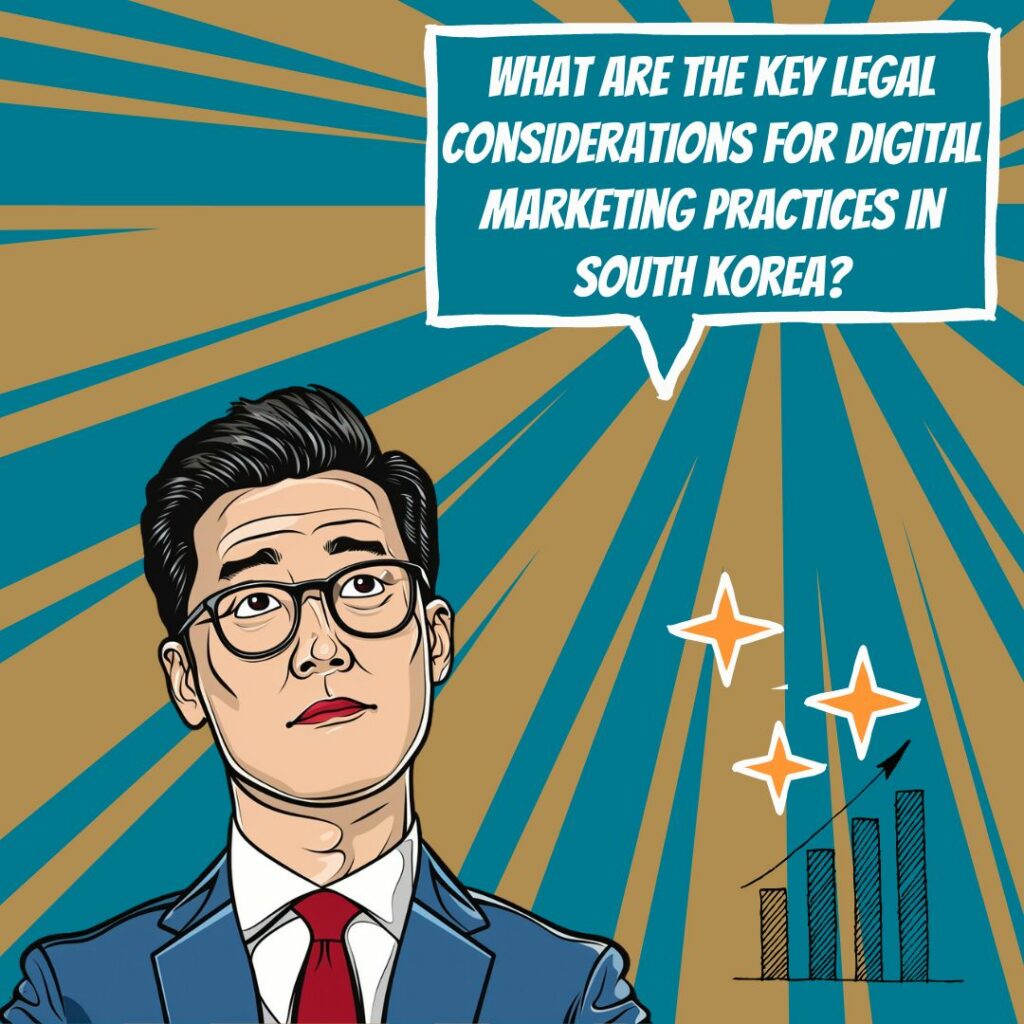Key Takeaways
✅ Adherence to South Korea's Personal Information Protection Act (PIPA): A safe bet in digital marketing is respecting privacy. If you're collecting data in South Korea, you've got to get consent first. It's not just polite; it's the law. PIPA also expects you to shield that information like it's a treasure. Did you know that data breaches can cost companies big money and trust?
✅ Respect for the Network Act: Avoid the oops of deceptive ads. South Korea takes truth in advertising seriously. Don’t just slap on a ‘sponsored’ label and call it a day. You must also get a nod before you start tracking folks with cookies. Blink and you might miss it, but about 70% of netizens are now savvy enough to dodge sneaky ads.
✅ Compliance with the Act on Fair Labeling and Advertising (AFLA): Keep your ads above the fray. AFLA is like the referee in a game, keeping the plays fair. Avoid the fake-out of false claims and comparisons that don't stack up. Cozying up with influencers? You’ve got to tell if you’re paying them. It's all about trust, and let's face it, won’t you rather buy from someone you trust?

Introduction
Ever stood at the edge of a new frontier, map in hand, ready to stake your claim? That's what entering South Korea's digital marketing territory feels like. But here's the twist: the map is a complex web of legal considerations and compliance rules. South Korea isn't just about high-tech hubs and "Gangnam Style." Their digital marketing scene's dynamite and not just for trends or tech – the laws are tight-knit too!
Why does this matter? Since the landscape here is so distinct, even trailblazers in the online world can trip up if they're not up to speed. Think data privacy, advertising regulations, and consumer protection – it's all part of the game. But don't worry, we’ve got the modern solutions you need. We’re not only covering the basics; we’re also uncovering how these can rev your traffic engines and zoom your revenue.
Consider this article your invitation to a quest filled with strategic insights and actionable tips that could spell the difference between a campaign that soars and one that fizzles out. Let's get you equipped and excited to conquer the digital marketing world in South Korea, shall we?
Top Statistics
| Statistic | Insight |
|---|---|
| Digital Advertising Market Size: Expected to reach $4.8 billion in 2021. (Source: Business Wire, 2021) | As the market size expands, understanding compliance and best practices becomes essential for entities aiming for successful digital campaigns. |
| Internet Penetration Rate: Stood at 96.4% as of January 2021. (Source: DataReportal, 2021) | High internet usage means a wide reach for digital marketing but also requires careful attention to legal frameworks to protect consumer rights. |
| Social Media Popularity: YouTube is accessed by 97.4% of internet users in South Korea. (Source: DataReportal, 2021) | The dominance of YouTube highlights an opportunity for targeted video advertising, emphasizing the need to keep content both engaging and legally compliant. |
| Mobile Internet Access: A whopping 97.5% of internet users connect via mobile devices. (Source: DataReportal, 2021) | With mobile as the primary access point, adapting to mobile-first marketing strategies while respecting data privacy laws can set businesses apart. |
| E-Commerce Market Valuation: Valued at $146.6 billion in 2020. (Source: Statista, 2021) | The booming e-commerce space is fertile ground for digital marketing, yet it requires vigilance to navigate the legal landscape effectively. |
Data Privacy and Protection
In the heart of Seoul, just as important as the latest tech gadgets, is the Personal Information Protection Act (PIPA)—South Korea's safeguard for personal data. If you're collecting information from customers, whether it's a simple email or their entire shopping history, you need to obtain their consent first. Thinking of moving that data beyond Korea's borders? Hold up—that's got some tight restrictions. Keep this in mind: the best defense against a data misstep is a good offense. That means getting serious about data security and managing personal info by the book.
Advertising Regulations
Picture your latest ad on a buzzing digital billboard in downtown Gangnam. To ensure it stays up there, you'd better align with the Act on Fair Labeling and Advertising. No room for phony promises or sly suggestions—ads in South Korea can't mislead or make unfair comparisons. And remember, transparency is key; if you've got a partnership with an influencer or a deal that's earning you commissions, your audience deserves to know upfront. Being straight with your customers isn't just nice, it's the law.
Intellectual Property Rights
Your brand's identity is as unique as your own fingerprint, so when it comes to digital marketing, the protection of copyrights, trademarks, and patents is your top priority. South Korea respects this fiercely. Getting caught in the web of IP infringement is a sticky affair you'll want to avoid. Make sure you're using only content you have rights to and defend your own creations like a dragon guarding its gold—because, in the digital world, that's exactly what they are.
Social Media and Influencer Marketing
Let's chat about the powerhouse duo: social media and influencers. They're like the kimchi and rice of the marketing world—uber popular and undeniably effective. But here's the thing: just as kimchi recipes vary, so do the rules for disclosure requirements. Is an influencer singing praises about your product? They need to be upfront about their partnership with you. Navigate this by keeping your influencer collaborations clear as daylight and finely tuning your social media strategy.
Consumer Protection
Now, let's talk about keeping things fair and square with the people who matter most—your customers. South Korea takes this seriously through the Act on Fairness in Franchise Transactions and Consumer Protection. Be the business that excels at honesty, not the one caught in a scandal. Uphold transparent business practices from the get-go, handle customer complaints like a pro, and maintain a policy that your grandma would approve of. This is the pathway to building trust and loyalty with your consumers.
Best Practices and Staying Informed
In the realm of digital marketing, laws and regulations can change faster than K-Pop band line-ups. To stay on top of your game, it's not enough to just set up shop and go forth. You need to keep an ear to the ground for regulatory changes. Use official government websites and legal resources to stay informed. By doing so, you not only comply with regulations but also position yourself as a trusted brand that knows how to play by the rules—and win.
AI Marketing Engineers Recommendation
Recommendation 1: Stay Up-to-Date with Data Privacy Regulations: Navigating the digital marketing landscape in South Korea means understanding and complying with the Personal Information Protection Act (PIPA). This act has strict guidelines about data collection, usage, and storage. It's not just a suggestion—it's the law, and it's been getting tighter. Have you checked the latest amendments? Start by conducting a thorough review of your data handling processes. By doing so, you're not just avoiding hefty fines; you're building trust with your audience. Nobody likes their private information mishandled, right?
Recommendation 2: Embrace Transparency in Advertising Disclosures: Consumers everywhere are getting smarter and more skeptical. In South Korea, they really value honesty. So, when it comes to promotion or endorsements, especially with celebrities or influencers—which are huge in South Korea—flaunt your authenticity. The Act on Fair Labeling and Advertising requires clear, unambiguous disclosure when advertising products. If you're partnering with an influencer, have you made it crystal clear that it's a paid partnership? Being upfront is not just good manners; it's savvy business, preventing misunderstandings that could lead to legal trouble.
Recommendation 3: Utilize Compliant Email Marketing Platforms: Email marketing, got to love it, but it's a minefield if you're not careful. With regulations akin to the EU's GDPR, South Korea’s laws on unsolicited emails are strict. They require opt-in consent and an easy opt-out option. So, what's your best move? Use email marketing platforms that are designed to comply with these rules. They've got features like double opt-in procedures and clear unsubscribe buttons. Beyond keeping you legal, these platforms often have analytics to see what's resonating with your audience. Have you ever wondered if your emails are even being read? Well, with the right tools, you won’t have to.
Conclusion
Well, we've journeyed through the maze of legal considerations for digital marketing in South Korea, and it's pretty clear why crossing your T's and dotting your I's is a big deal in this game. Have you picked up the importance of staying on top of things like the Personal Information Protection Act and the Act on Fair Labeling and Advertising? It's not just bureaucratic tape—it keeps your brand in good graces and away from costly slip-ups.
Data privacy, advertising norms, intellectual property rights, and the ins and outs of influencer marketing—these aren't just bullet points, they're your roadmap to good standing in a digital landscape that's as vibrant as it is meticulous. And remember, consumer protection is not just about following the law; it's about winning the trust and hearts of your audience. That's something you can’t put a price tag on, right?
What are your fears when it comes to navigating these waters? Are you worried about making a mistake or how these rules might change down the line? Or maybe, you're hopeful that with the right guidance, your marketing strategies can flourish under these regulations. Either way, it's about staying informed, agile, and respectful of the landscape. Don't let the complexity scare you—consider it a partner in creating a marketing plan that’s not only effective but also responsible and ethical.
As regulations keep evolving, let's keep the conversation going. Where do you turn for updates, and how do you stay a step ahead in ensuring compliance? Sometimes you don't need all the answers, just the right questions to steer you towards continuous learning and growth in the world of digital marketing in South Korea. Keeping a keen eye on the horizon, ready for what's next—that's the best practice there is.
FAQs
Question 1: What are the primary laws and regulations that govern digital marketing in South Korea?
Answer: In South Korea, you've got the Act on Promotion of Information and Communications Network Utilization and Information Protection, also known as the Network Act, the Personal Information Protection Act (PIPA), and the Act on Fair Labeling and Advertising to follow.
Question 2: How does the Personal Information Protection Act (PIPA) affect digital marketing in South Korea?
Answer: PIPA makes sure you're playing it cool with people's private info. You've got to ask nicely before you take any personal data, and once you have it, you've got to keep it safe.
Question 3: What are the rules for collecting and using personal information in digital marketing campaigns?
Answer: You need permission first before you gather any personal information. Make your privacy policy crystal clear and let folks easily say "No thanks" to your marketing messages if they want to.
Question 4: What are the rules for sending marketing emails in South Korea?
Answer: First off, you need a yes from the recipient before you push 'send' on those marketing emails. And always include an easy way for them to opt-out.
Question 5: What are the rules for using social media for digital marketing in South Korea?
Answer: Stick to the big three: the Network Act, PIPA, and the Act on Fair Labeling and Advertising. Transparency is key, so sponsored content should always be labeled as such, with no room for sneaky or misleading tactics.
Question 6: What are the rules for influencer marketing in South Korea?
Answer: Influencers have to be upfront when they're showing off sponsored goodies. They need to be honest and avoid creating any wrong impressions about the stuff they're promoting.
Question 7: What are the rules for targeted advertising in South Korea?
Answer: You need to get the green light before using personal details for targeted ads. And if someone wants out of the targeting, you've got to respect that.
Question 8: What are the penalties for non-compliance with digital marketing laws in South Korea?
Answer: Ouch, the penalties can hurt. We're talking fines, legal troubles, and a big smudge on your company's good name. The consequences vary, but they're never fun.
Question 9: What are some best practices for digital marketing compliance in South Korea?
Answer: Best practices boil down to asking for consent, protecting personal info like it's your own, being super clear about opting out, and always being upfront and honest in your marketing.
Question 10: What resources are available for digital marketers to stay up-to-date on legal considerations in South Korea?
Answer: Keep your eyes and ears open. Industry news, seminars, and legal boffins can help you stay in the loop. And don't forget about KISA and KCC – they're the go-to's for the latest on digital marketing laws.
Academic References
- Kim, J. & Choi, Y. (2018). Legal Framework for Digital Marketing in South Korea: An Overview. Journal of International Commercial Law and Technology, 13(1), 1-15. This article provides a comprehensive overview of the legal framework for digital marketing in South Korea, including the Act on Promotion of Information and Communications Network Utilization and Information Protection, the Personal Information Protection Act, and the Act on Fair Labeling and Advertising. The authors highlight the importance of compliance with these laws and regulations to avoid penalties and maintain consumer trust.
- Lee, H. & Park, J. (2017). Data Privacy and Digital Marketing in South Korea: Challenges and Opportunities. International Journal of Law and Information Technology, 25(2), 149-165. Discussing challenges and opportunities in data privacy with respect to digital marketing in South Korea, the authors stress on the necessity for companies to adopt best practices for data handling to comply with the Personal Information Protection Act and maintain consumer trust.
- Lee, D. & Kim, J. (2019). Digital Marketing and Consumer Protection in South Korea: A Comparative Analysis. Journal of Consumer Policy, 42(3), 309-328. In this comparative analysis, the authors explore the legal framework for consumer protection in digital marketing in South Korea contrasted with other countries, emphasizing adherence to the Act on Fair Labeling and Advertising and detailing the Korea Fair Trade Commission's enforcement role.
- Park, S. & Lee, Y. (2019). The Impact of the EU General Data Protection Regulation (GDPR) on Digital Marketing in South Korea. Journal of International Commercial Law and Technology, 14(1), 20-35. This paper delves into the implications of the EU GDPR on South Korean digital marketing practices and underscores the significance of adopting data protection best practices to meet the requirements of both South Korean and EU law, despite GDPR's indirect applicability.
- Kim, H. & Park, S. (2020). Influencer Marketing in South Korea: Legal Considerations and Best Practices. Journal of International Commercial Law and Technology, 15(1), 55-70. Covering influencer marketing in South Korea, the authors discuss the necessary legal considerations and best practices, especially compliance with the Act on Fair Labeling and Advertising and the Personal Information Protection Act, as well as the Korea Fair Trade Commission's regulatory role.












